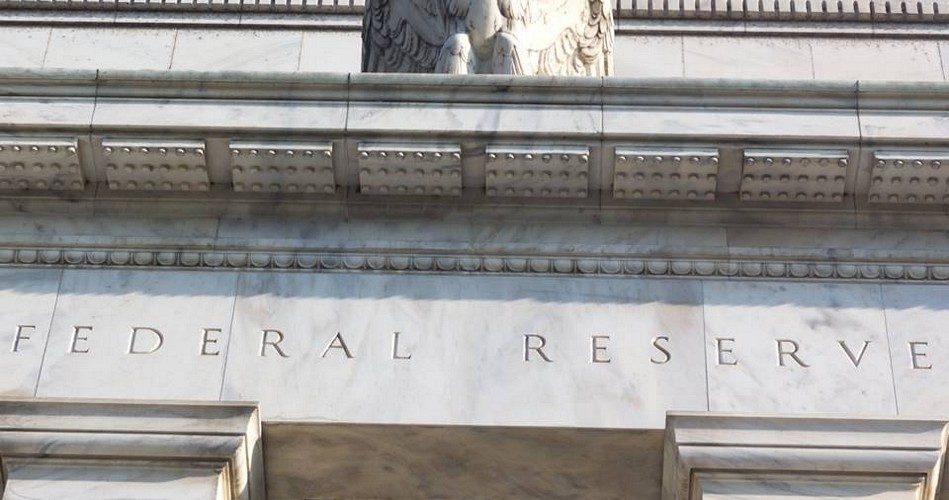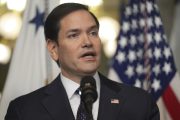
President Donald Trump has asked the former economic advisor to his campaign, economist and writer Stephen Moore, if he would accept a nomination to the Board of Governors of the Federal Reserve. There are two openings on the board, and Moore would fill one of them.
Moore’s resume is imressive. A graduate of George Mason University with a degree in economics, Moore spent 10 years as a fellow at the libertarian think tank Cato Institute. He founded and served as president of the Club for Growth, resigning from the group in 2004. He was on the editorial board of the Wall Street Journal and then took a position with the Heritage Foundation as its chief economist. He now serves the Heritage Foundation as a distinguished visiting fellow.
These positions have given him the opportunity to write frequently for the Journal as well as the Washington Times, the Weekly Standard, and National Review.
He has not been kind to the Fed when given a chance to write about its recent policy decisions. The day that the Fed raised interest rates last December, Moore let fly. In an interview with the Gateway Pundit, he unloaded on the Fed’s Board of Governors chaired by Jerome Powell:
In one of the most remarkable Abbott and Costello routines in modern times, the economic wizards at the Fed again raised interest rates on Tuesday. Their Cracker Jack logic for doing so is to steer America on a course toward recession so they have the tools in hand to end the recession that THEY themselves created. Can anyone tell us who’s on first?
Worse, this Fed move doubles down on its blunderous interest rate rise in September. President Trump turned out to be exactly right: the central bank’s pull back on money would slow growth and crush the stock market in order to combat nonexistent inflation.
The Fed’s policies of raising interest to fight the spectre of incipient inflation and continuing to offload some of its vast holdings of government securities served as a double-whammy on Trump’s economy. Moore explained:
The Fed had already reduced the monetary thrust that it provides to the economy eight times since December 15, 2015, by raising its Fed Funds interest rate from 0.25% to 2.25%. Each time, the Fed claimed that it needed to guard our economic airliner from inflationary “overheating” — as if its job is to prevent too many people from working and making sure that pay checks aren’t rising too quickly.
Unfortunately, if you cut engine power too far on a jetliner, it will stall and drop out of the sky.
The Dow Jones Industrial Average dropped more than 4,000 points as the economy’s oxygen hose was being stepped on by the Fed’s policies led by its chairman:
Chairman Powell has been entirely tone deaf to the financial markets he seeks to protect….
Since its peak on October 3 … the Dow has fallen by more than 3,500 points [now 4,500]. Market fears about his bad judgment have cut the value of all U.S. stocks by about $4.5 trillion, which is enough to buy 16,000 Boeing 787 Dreamliners.
Moore doubled down two weeks ago while being interviewed at The Cats Roundtable on 970 Radio in New York:
I’m a big believer that the Federal Reserve is probably the most responsible for the slowdown of the economy in the first quarter.
We saw how they wrecked the economy before Christmas when the stock market fell like 4,000 points [on the Dow]. And we are still feeling the residual effect of a very very tight money system….
If you have a booming economy, you have to provide the dollar liquidity that will let the economy grow. It’s like providing the oxygen for the economy, and the Fed isn’t doing that.
Last Wednesday, Moore had another chance to take down the Fed over its policies, this time in an article published by the Wall Street Journal. After touting the Trump economy and its success in putting people back to work and raising economic growth “to 3.1% over the past four quarters — the best performance since 2005,” Moore excoriated the Fed for getting in its way: “The last major obstacle to staying on this path is the deflationary policy [withdrawing money from the economy by selling off some of its government bonds] of the Federal Reserve.… It’s hard to see what the Fed didn’t like about this economic picture. What problem were they trying to solve?”
Moore made it clear that the stock market selloff had nothing to do with weakness in the economy: “It was all the Fed’s doing,” he said, adding:
When the Fed finally admitted its money-tightening mistakes in late December and announced it would forgo its planned rate increases, the deflation stopped and the stock market largely recovered, in tandem with commodity prices. But the damage was done….
We estimate that the Fed’s deflation has already chopped 1 to 1.5 percentage points off real growth over the past six months.
Optimists are hopeful that, once confirmed, Moore will add a voice of reason to the conversation that takes place around the table of the Board of Governors. Realists are more inclined to suggest his voice will be muted by other voices seeking a more active role for the Fed in “managing” the economy.
Cynics are likely to suggest that the best way to silence one of your sharpest critics is to invite him to join your posse and then assimilate him. They are afraid that once Moore is confirmed and takes his place at the table, no one will be hearing much from him about the Fed’s manipulations and machinations that are intentionally and deliberately slowing Trump’s economic miracle.
Image: amedved via iStock / Getty Images Plus
An Ivy League graduate and former investment advisor, Bob is a regular contributor to The New American, writing primarily on economics and politics. He can be reached at [email protected]


